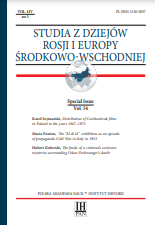Józef Piłsudski and the Polish-French Alliance (1926-1935)
Józef Piłsudski and the Polish-French Alliance (1926-1935)
Author(s): Małgorzata Gmurczyk-WrońskaSubject(s): Diplomatic history, Political history, Interwar Period (1920 - 1939)
Published by: Instytut Historii im. Tadeusza Manteuffla Polskiej Akademii Nauk
Keywords: Józef Piłsudski; Polish-French alliance 1926-1935; Polish foreign policy in the interwar period; Poland; France;
Summary/Abstract: Piłsudski saw France as an important power that could support the independence aspirations of Poles. Piłsudski travelled to Paris as Chief of State in early February 1921, shortly before the signing of the Polish-French alliance. The political and military alliance signed on 19 and 21 February 1921 fulfilled, at least until the mid-1920s, its assigned protective role-mainly against the German threat, but also, to some extent, against the Soviet one. However, its condition and role began to change under the influence of the shift in French foreign policy related primarily to the concept of collective security, as well as the shift in Polish foreign policy. In 1933, however, Piłsudski declared that Poland was always ready to fulfil its obligations towards France as its ally, and defined the alliance with France as a foundation of Poland’s “national policy.” While the Marshal appreciated the role of the League of Nations, he did not believe in the effectiveness of its procedures which were to ensure Poland’s security. However, he was determined to preserve the alliance with France. One might argue that after 1926 Piłsudski sought to strengthen this alliance. This turned out to be extremely difficult, as France actively sought to weaken it. The lack of success in the plans of strengthening the Polish-French alliance or positive prospects for the stability of the international system, as well as the need to ensure Poland’s security, resulted in the modification of the Polish foreign policy. In historiography, it is called the “policy of equilibrium” and involves the signing of the 1932 non-aggression pact with Soviet Russia and the 1934 declaration on non-violence with Germany. According to Piłsudski’s strategy, the alliance with France, as with Romania, continued to play a major role, but was complementary to the pacts with Moscow and Berlin.
Journal: Studia z Dziejów Rosji i Europy Środkowo-Wschodniej
- Issue Year: 54/2019
- Issue No: Sp.
- Page Range: 65-80
- Page Count: 16
- Language: English

